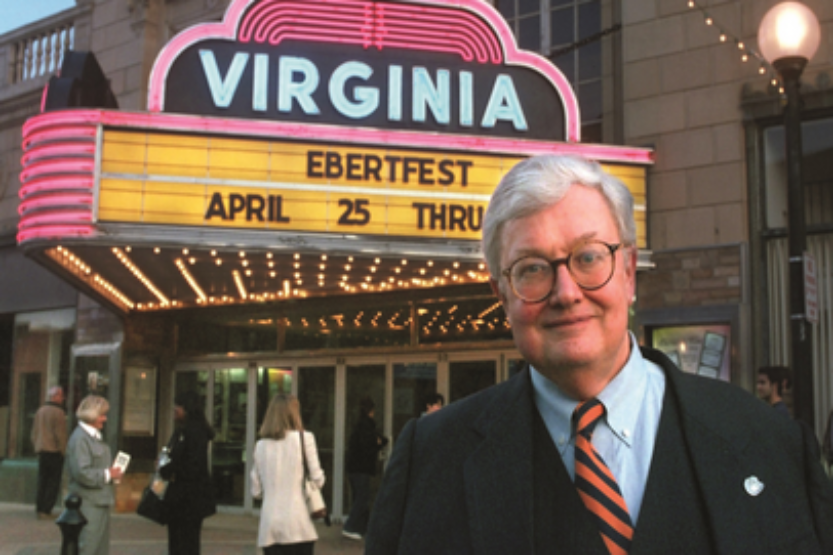Thumbs-Up
 Late film critic Roger Ebert at the festival he established in Champaign, Ill. Photo courtesy of the News Gazette
Late film critic Roger Ebert at the festival he established in Champaign, Ill. Photo courtesy of the News Gazette The little boy in the big glasses walked past the Quad’s lawns and crowds and entered the enormous English Building at his father’s side.
Roger Ebert ’64 MEDIA watched his dad take out his tools to fix an electrical problem.
Young Roger had no special desire to become an electrician like his father. He was confident and clever from the very beginning. Roger liked thinking. And talking. And writing.
Walter Ebert knew that the University of Illinois was the way up for his son. “He used to tell me about how all the English professors sat around with their feet up on the desks, reading, and he said that was the perfect job for me,” Roger told me in a 1989 interview.
So Ebert read and then wrote and then watched, building a career first as a journalist and then as a film critic. He shifted the conversation from the vaunted aeries of film historians to the living rooms of the everyday public, encouraging people to notice intricacies and overviews, introducing international films, reintroducing classics, examining genres, and praising and excoriating directors, actors and editors – all the while never, ever taking the delight out of simply being “at the movies.”
Ebert lifted an ancient Roman symbol from obscurity and elevated it to one of the most well-known gestures of his time – the simple thumbs-up or thumbs-down – as he appraised what appeared on the silver screen. He accumulated a prodigious amount of knowledge over the decades but never lost his ability to disseminate it succinctly and personably via television, books, reviews and public appearances. Indeed, in 1975 his work earned him the first Pulitzer Prize to be given for film criticism.
As a young man, Ebert knew that bigger things were in his future, but it didn’t stop him from adoring his hometown and his Alma Mater. “Roger was … dedicated to his heritage, his family, his friends,” says Betsy Barstead Hendrick ’61 MEDIA, a UI student and fellow (Champaign-Urbana) News-Gazette staffer who went on to own the Hendrick House student residence hall in Urbana.
Ebert loved everything about the Urbana campus, from classes to parties to politics to girls. Ron Szoke, MS ’61 LAS, PHD ’69 LAS, wrote film reviews for him at The Daily Illini, where Ebert served as editor-in-chief. Szoke went to parties that Ebert dominated with his wit and energy, where he seemed “exultant, very vocal … a source of endless puns,” Szoke recalls, and a lusty singer of union songs.
If Ebert liked something, he loved it, and wanted everyone else to love it, too. He respected a UI English professor and author named Daniel Curley. “I practically majored in him,” Ebert noted; in fact, he took 26 hours of Curley’s classes. Later, they would write a book together, The Perfect London Walk.
When Ebert joined the Chicago Sun-Times in 1966, he found a home for life. He soon became a multimedia pioneer – there were the movie books and the long profiles in Esquire magazine. There was that one screenplay, a sequel to the boozy sexscapade Valley of the Dolls. Much later, after losing his voice to cancer, he would become a champion blogger.
His film review television shows with Chicago Tribune movie critic Gene Siskel made the two household names and earned them appearances on programs such as The Tonight Show. Ebert could have made it in New York or LA, but he stayed in Chicago, maybe because it was so close to Urbana, where he first watched movies at the Princess Theatre, now an art showcase called, aptly, the Cinema Gallery.
Ebert gave, and gave and gave again to the town and the University. Roger Ebert’s Film Festival, now in its 15th year, could have been in a much bigger venue, but he chose the historic Virginia Theatre in Champaign (only because his beloved Urbana did not have a facility with enough seating). By sheer force of personality and the respect in which he was held, Ebert gathered not just the films themselves but their actors, directors and editors to venture to east central Illinois – for the love of film. In 2009, Ebert and his wife, Chaz, established an endowment for the Roger Ebert Program in Film Studies in the College of Media.
Ebert died peacefully on April 4, at age 70, just a few weeks before his annual film festival opened in Champaign.
“The University of Illinois is deep in my heart as a great institution,” he once said.
And you, Roger, remain deep in ours.
Wood ’77 LAS is a features writer at The News-Gazette in Champaign.

